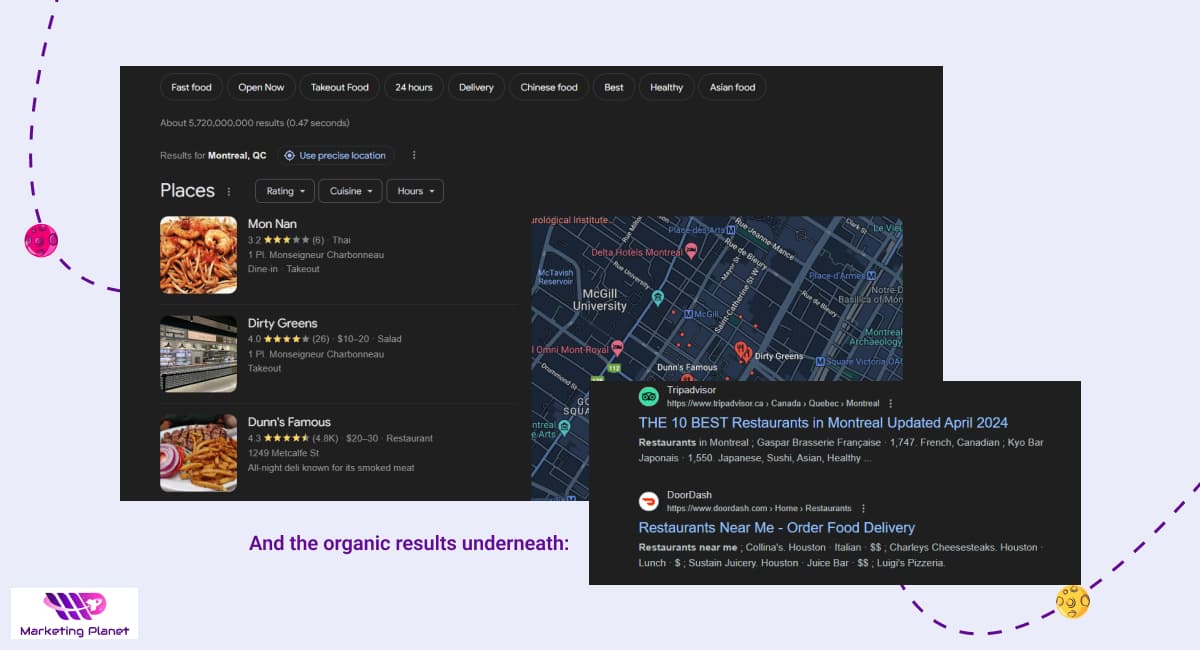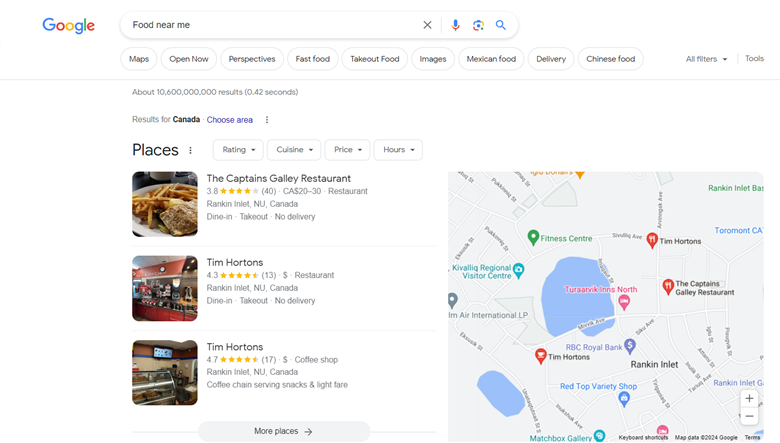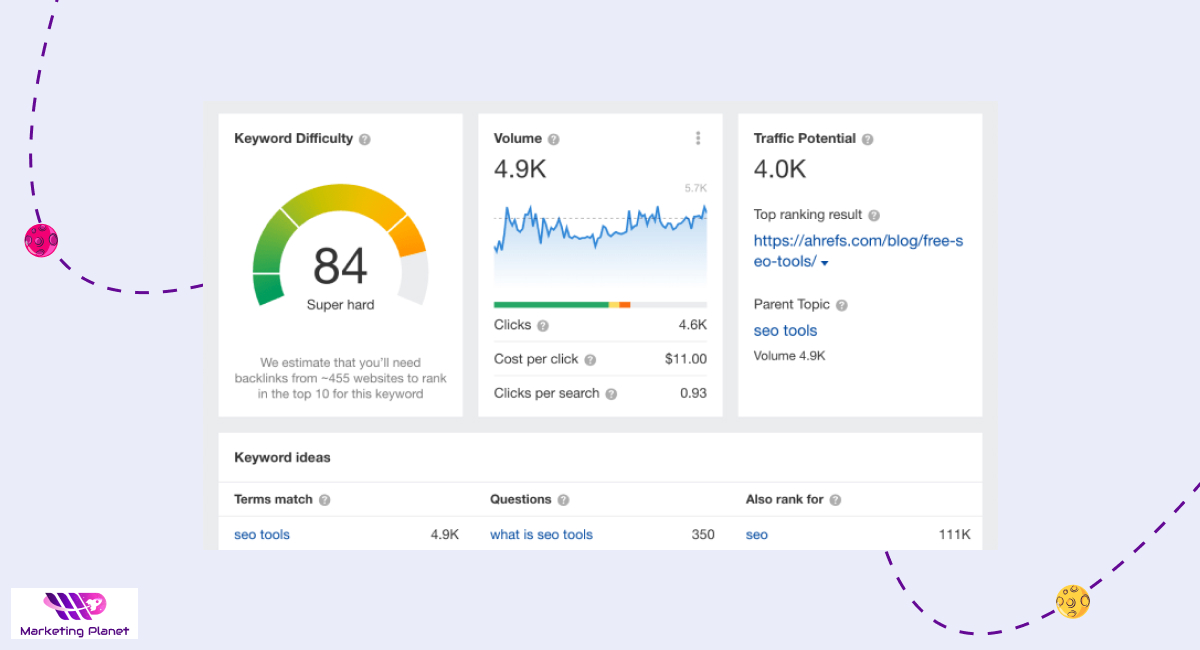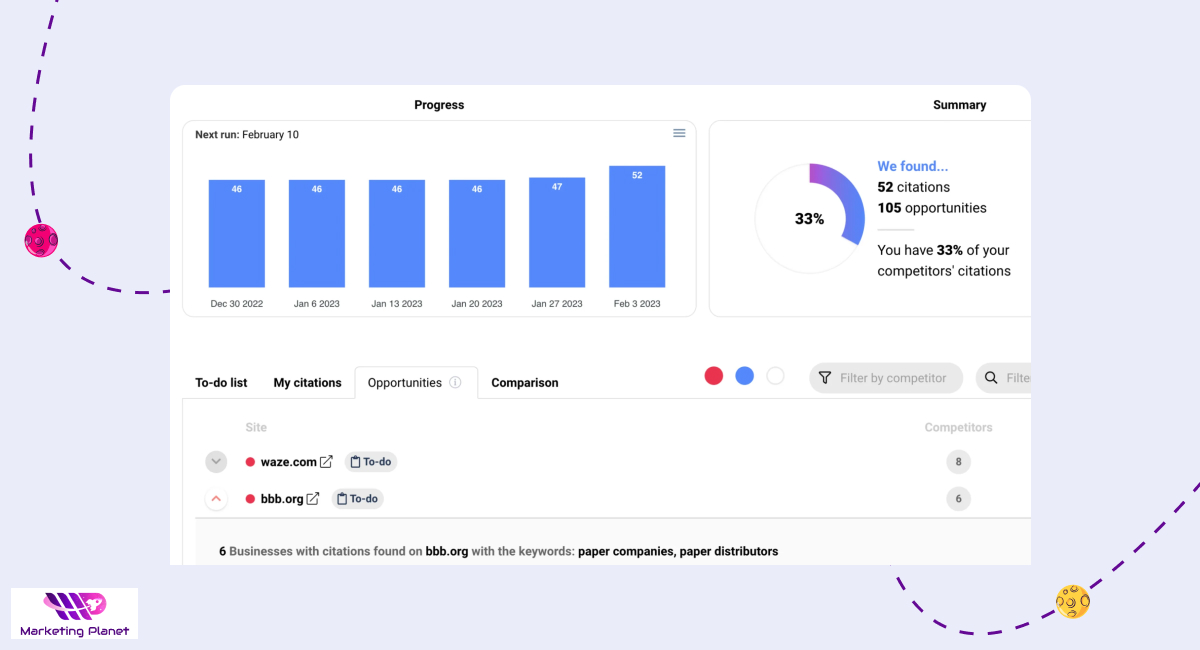Did you know nearly half of all Google searches are for local information? If your small business isn’t optimized for local search, you’re missing out on potential customers searching for what you offer right in your area.
Table of Contents
ToggleThat’s where local SEO comes in. It’s crucial to stay relevant and reach local customers using search engines to find businesses like yours.
Our comprehensive guide is packed with tips and tools to help you master local SEO. By the end, you’ll know exactly why local SEO is important, how it works, and how to do local SEO.
What is Local SEO?
Local SEO (Search Engine Optimization) is the practice of optimizing your online presence to increase visibility in local search results. This helps your business attract more customers searching online for products or services offered in your area.
Here’s a breakdown of what it involves:
- Optimizing your Google Business Profile: This is your free business listing on Google, and it plays a crucial role in local search ranking.
- Finding the right local keywords: These are the specific phrases people use to search for businesses like yours in your local area.
- Creating locally relevant content: This could be content about your products or services, local events, or anything else that would be of interest to potential customers in your area.
- Building citations: These are mentions of your business name, address, and phone number (NAP) online, across various directories and websites.
Why is Local SEO Important?
Local SEO marketing is crucial for attracting local consumers. Over 75% of consumers consider Google the most dominant search engine for local search in the US, France, Germany, and the UK.
Google Maps searches for “shopping near me” have grown globally by over 100% year over year, while mobile searches for “store open near me” and “where to buy” have grown by over 200%. This results in hundreds of millions of daily searches for local businesses.
So, local SEO is crucial for businesses that want to attract customers searching online within a specific geographic area. Here’s why it’s important:
Increased Visibility
Local SEO helps your business appear higher in local search results, particularly on Google Maps and the local pack. This increases the chances of potential customers finding your business when they search for relevant products or services nearby.
Targeted Traffic
By optimizing for local searches, you attract qualified leads who are more likely to convert into customers. This is because they are already interested in what you offer and are actively searching for businesses in their local area.
Builds Trust and Credibility
A strong local SEO presence, including positive online reviews and accurate business information, can build trust and credibility with potential customers. This can influence their decision-making process when choosing a local business.
Cost-Effective Marketing
Compared to traditional advertising methods, local SEO can be a more cost-effective way to reach your target audience. By implementing effective local SEO strategies, you can attract more customers without breaking the bank.
Overall, local SEO is an essential strategy for businesses looking to connect with local customers and grow their business online. If your business has a physical location or serves a specific geographic area, investing in local SEO can be crucial for your success.
How Local SEO Works?
Google’s local search algorithms use three main factors to find the best match: relevance, distance, and prominence.
They display two types of search results for local searches: “local pack” results (Google Maps and Business Profiles) and organic results.
Organic results are the normal blue link search results, while local pack results show the top local business listings and a map. Both types of search results help users find relevant and relevant businesses for their queries.
For example, when you search for “Food near me,” Google displays a local pack at the very top.
And the organic results underneath.
While including city, state, or “near me” in your search does trigger local results, it’s not the only way Google identifies local intent. Google is smart enough to understand the underlying purpose of your search and deliver local results even if you don’t explicitly mention location.
For instance, if you’re searching for “pet shops” while in Los Angeles, Google will display results for Los Angeles pet shops, recognizing your local needs despite the absence of location keywords.
How to Do Local SEO?
It’s time to put together a plan to raise your local rankings and drive more traffic. You can get started by following the steps below.
1. Do Local Keyword Research and Identify Local Keywords
- Leverage Google Autocomplete: Start typing your business category or service with your location in Google search and see the suggestions that appear. These are popular local searches.
- Use keyword research tools: Explore keyword research tools like Semrush, Ahrefs, or Moz to discover relevant keywords with search volume and local intent.
- Consider local modifiers: Include city, town, neighborhood, or zip code in your keyword phrases. For example, “plumber Los Angeles” or “hairstylist near me.” This will help you see what your competitors are doing and is an easy way to start gathering ideas.
2. Optimize Your Google Business Profile
- Claim and verify your listing: Search for your business on Google My Business and claim your profile if it exists. If not, create a new one. Verification through postcard or phone is required.
- Complete your profile: Fill out all information accurately and comprehensively, including business name, address, phone number, website, category, description, hours of operation, and high-quality photos.
- Engage with your listing: Regularly update your profile with posts, respond to reviews, and answer questions from potential customers.
3. Build NAP Citations
NAP stands for Name, Address, and Phone number. Ensure your NAP information is consistent across all online directories and listing platforms. Inconsistencies can negatively impact your rankings.
- Find existing citations: Use free tools like Moz Local or Yext to discover existing citations mentioning your business.
- Claim and update citations: Claim your listings on relevant directories and ensure your NAP details are accurate and consistent.
- Build new citations: Submit your business information to high-quality local directories and niche-specific platforms relevant to your industry.
4. On-Page SEO Optimization
- Optimize page titles and meta descriptions: Try taking your on-page SEO optimization to the next level by including your target keywords naturally within your page titles and meta descriptions for both your main website and location-specific pages.
- Create location pages: If you have multiple locations, create dedicated pages for each with unique content addressing the specific area.
- Use local schema markup: Implement local schema markup on your website to provide search engines with richer information about your business, such as location, opening hours, and accepted payment methods.
- Optimize website for mobile: Ensure your website is mobile-friendly, as many local searches happen on smartphones.
5. Content Creation and Link Building
- Create local content: Publish valuable content relevant to your local audience, like blog posts, guides, or community event information.
- Get local backlinks: Acquire backlinks from high-quality websites in your local area or relevant to your industry. Encourage local partners, organizations, or bloggers to link to your website.
6. Online Reviews and Reputation Management
- Encourage customer reviews: Request satisfied customers to leave positive reviews on Google My Business and other relevant platforms.
- Respond to all reviews: Address both positive and negative reviews promptly and professionally. Thank customers for positive feedback and acknowledge concerns raised in negative reviews, offering solutions where possible.
7. Track and Analyze
- Monitor your rankings: Use tools like Google Search Console or local SEO rank trackers to monitor your website’s ranking for your target keywords in local search results.
- Analyze your website traffic: Use website analytics tools like Google Analytics to understand how local SEO efforts impact website traffic and conversions.
Top Local SEO & Listings Management Tools
After discussing how to make your company more local search engine friendly, let’s look at some useful resources you can use to raise your ranking where it counts most.
1- Ahrefs
Ahrefs goes beyond simply checking backlinks, which are crucial indicators of your website’s authority in search engine rankings.
It empowers you with a comprehensive SEO toolkit, including competitor analysis, keyword research, and the ability to analyze how other websites link to yours through their anchor text.
This multifaceted approach empowers you to refine your SEO strategy and gain a competitive edge.
2- Moz Local
While remaining cost-effective compared to many competitors, Moz Local tackles two crucial aspects of local SEO:
- Verification and Distribution: It streamlines the process of verifying your business listings on key platforms like Google and Facebook, while simultaneously distributing your information across a wider search ecosystem.
- Enhanced Visibility: Moz Local collaborates with data aggregators to actively push your listings, ultimately increasing your business’s online presence and discoverability.
3- Yext
Yext is a platform that offers a system for updating listings, optimizing them for search engine visibility, and integrating with various networks for easy business visibility.
It offers a local listings management tool that allows for real-time updates, analytics, and suggestions for improvement.
Yext also provides services such as data cleansing, duplicate listing prevention, and Google Business Profile (GBP) management, allowing users to make updates and publish them to GBP at any time.
4- Whitespark
Whitespark, a web design agency, offers SEO software tools for businesses to improve local search marketing.
The Citation Finder tool is the most popular, offering free access to three daily searches and limited search results. Paid subscriptions start at $33/month for five campaigns, 20 daily searches, and unlimited search results.
Other notable Whitespark local SEO tools include the Local Rank Tracker, which provides insight into SEO performance across popular search engines and different result types.
The Reputation Builder prompts customers to share reviews on review sites, calculates Net Promoter Score, and allows businesses to respond directly to Google and Facebook recommendations.
Finally, Review Monitoring alerts businesses to bad reviews, allowing them to take immediate action. These tools help businesses improve their local search rankings and compete in the market.
5- Semrush Listing Management
Semrush, a popular search analytics and local SEO software, has developed a local listing management tool in collaboration with Yext.
This tool allows users to manage listings, reviews, and local pages. It uses Yext’s Knowledge Network to publish data across platforms like Facebook, Foursquare, and TripAdvisor.
Users can manage information from the Semrush listing management dashboard. The tool is easy to use, presenting a list of listings and their status per directory website. It is only available to users in five countries: U.S., U.K., Australia, Germany, and France.
What Kind of Businesses Need Local SEO?
Local SEO benefits all businesses, but industries with physical establishments or geographic areas need it more. These niches or industries should incorporate local SEO into their business strategy to maximize its benefits.
1- Restaurants
The most searched ‘near me’ keyword in America is ‘restaurants near me’, with 7.2 searches. SEO is crucial for food establishments as people increasingly rely on their phones for recommendations, delivery information, menus, and directions. A local SEO campaign can help restaurants gain visibility and attract more locals and visitors.
2- Accounting and Finance
Research shows that 85% of buyers conduct their research before purchasing a product or service. Prioritizing providing necessary information and ensuring your presence on the internet is crucial for accountants.
With easy access to the internet, people feel secure and less anxious, leading to more informed decisions. Local SEO for accountants helps prospective clients find your business and provide relevant content to answer questions and initiate conversations.
3- Medical Industry
Local SEO is crucial for physicians like plastic surgeons, chiropractors, pediatricians, and dentists to ensure their services are easily accessible to locals, as they rely heavily on Google for recommendations and directions.
4- Real Estate
SEO is crucial for real estate agents and firms as the industry gains significant online attention from people searching for new places, as they often have a specific state, city, or town in mind when checking out houses, condos, apartments, or townhouses.
Conclusion
Local SEO is no longer optional for businesses with a local presence. It’s the key to unlocking the full potential of your local market. By understanding the core principles, implementing effective strategies, and staying updated with the evolving landscape, you can establish a strong online presence, attract more local customers, and drive sustainable growth for your business in 2024 and beyond.
















